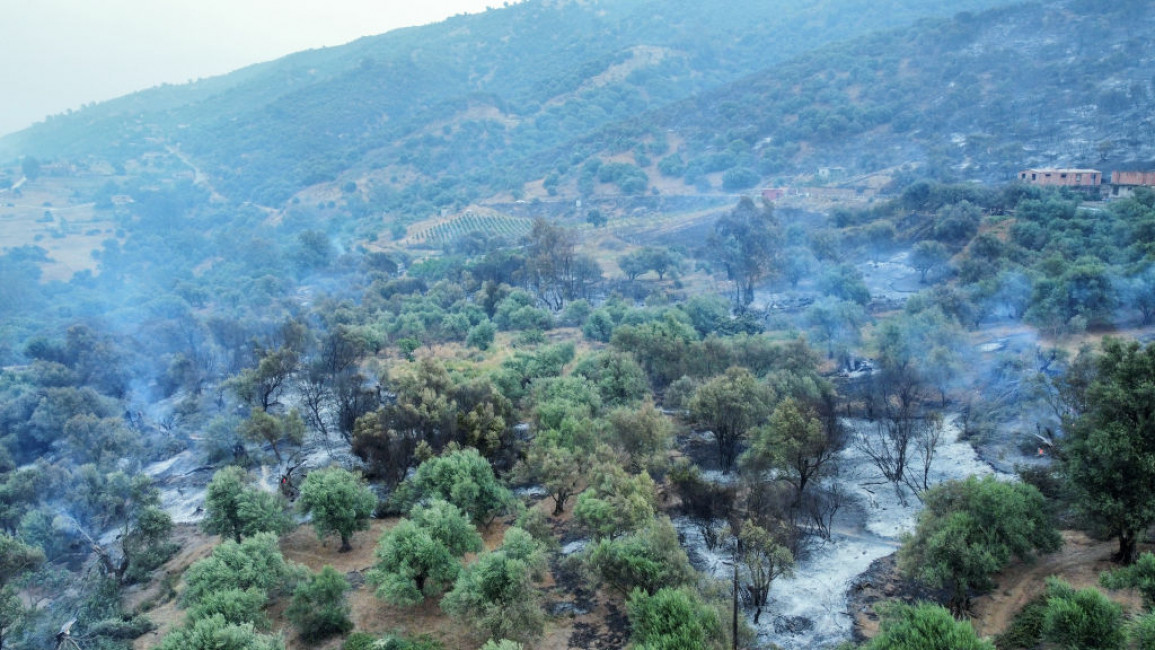Algerians blame government's 'poor planning' over wildfire fatalities
As deadly blazes ravage throughout the Mediterranean from Greece to North Africa, Algerian firefighters continue for the fourth day to battle wildfires spread across the tinder-dry regions of the Mediterranean coast.
But the affected residents say their government's lack of efforts and planning is to blame for their loss.
"Every year, this happens. We lose our homes, our neighbours, our shops and everything. They don't take any measures to protect us," Samir, an Algerian resident in Ait Ousaleh, northeastern Algeria, told The New Arab.
In Algeria, the fires have killed 34 and injured over 80 people, 25 of them military personnel, across the north, destroyed homes and coastal resorts, and turned vast forest areas into blackened wastelands.
Out of 97 blazes burning over three days, most had been controlled as temperatures dropped somewhat and winds eased, but 11 were still raging by Tuesday, 25 July afternoon, authorities said.
Algeria's President Abdelmadjid Tebboune sent his condolences to the families of those killed - among them, ten soldiers trapped by flames at Beni Ksila, in Bejaia province, according to the defence ministry.
Severe fires have raged through the mountain forests of the Kabylia region on the Mediterranean coast.
Fanned by winds during blistering heat that peaked at 48 degrees Celsius Monday, residents said they didn't have much time to pack their valuable belongings.
"I have nowhere to go. The fire destroyed my house and my son's house completely," said a woman in her seventies, crying on an Amazigh TV channel after losing her daughter-in-law and granddaughter near Bejaia, Ait Ousaleh.
Witnesses described fleeing walls of flames that raged "like a blowtorch". Videos on social media showed charred cars and shops reduced to ashes.
Severe fires have also raged recently in neighbouring Tunisia, especially the northwestern Tabarka region.
More than 300 people were evacuated from the coastal village of Melloula by boat and overland to nearby schools.
"We don't know where we will go after. We are hoping that by some miracle these fire stop," Nouzha, a Tunisian woman and one of the evacuated, told TNA.
Nouzha said her husband is still in the area helping volunteers and firefighters to extinguish the fires. At least 100 have been injured in Tunisia.
Tunisian President Kais Saied arrived in Melloula on Monday to meet the victims.
Firefighters are still battling flames Tuesday in three areas in the northwest: Bizerte, Siliana and Beja.
Greece is also battling wildfires on three major fronts, and Italy's Civil Protection Department reported "extensive fires" across the south on Tuesday.
Algeria investigates 'possible perpetrators' behind the wildfires
In August last year, fires killed 37 people in the northeastern El Tarf region, a year after 90 died, mainly in Kabylia.
To prepare for this year's fire season, Algerian authorities deployed observation drones and created multiple helicopter landing sites, purchased a large water bomber aircraft and rented six others from South America.
About 7,500 firefighters and 350 trucks aided by aerial support were battling to bring the flames under control across the country, authorities said, including in the Boumerdes, Tizi Ouzou, Jijel and Skikda regions.
Local media TSA news wondered, "In view of all these measures, why couldn't we avoid the disaster?"
The public prosecutor of Algeria's Bejaia has ordered an investigation into "the causes of the fires and possible perpetrators."
Last year, Algeria blamed devastating wildfires on two terrorist organisations, saying that Morocco and Israel backed one. Later, Algeris decided to cut off relations with Rabat because of "its hostile acts."
In a statement, Morocco, with which Algeria severed diplomatic relations in August 2021, said it was following "with great sorrow and regret" the forest fires in the neighbouring country and offered its condolences for the human losses.
Scientists rank the Mediterranean region as a climate-change "hot spot", with the United Nations' Intergovernmental Panel on Climate Change warning of more heatwaves, crop failures, droughts, rising seas and influxes of invasive species.



